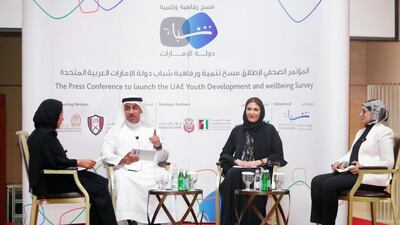ABU DHABI // Thousands of young Emiratis will take part in a survey that will shape the UAE’s future.
The study, announced on Sunday by Sheikh Abdullah bin Zayed, Minister of Foreign Affairs and International Cooperation, will involve about 6,600 people, aged between 15 and 30.
The Youth Development and Wellbeing Index Survey begins on April 2 for a period of four weeks. It will ask participants their opinions on topics including education, health care, employment, leisure, safety and security, values and traditions, living and media consumption habits, income and debt, civic responsibility and community engagement.
Sheikh Abdullah said the survey is a new method to define the needs of the youth in fostering the country’s development.
“Our main objective is to allocate the utmost priority in our national agenda to develop new programmes,” Sheikh Abdullah said about the 489-question survey.
He urged Emiratis to take part in the study and to encourage their peers to do the same.
Speaking at the survey’s launch on Sunday, Shamma Al Mazrui, Minister of State for Youth, said: “We realised that the youth want to be the architects of their own future and the youth index is another step in getting that data.”
Emirates Foundation, which is managing the survey, is working with the Emirates Youth Council and the Federal Competitiveness and Statistics Authority (FCSA) on the project.
Maytha Al Habsi, the foundation’s deputy chief executive, said data on local youth is lacking and such research is imperative.
“We need to understand the youth and their needs and trends. With the speed of changing lifestyles, we need new studies to base our programmes and strategies on,” she said.
Emirates Foundation will be mobilising volunteers to carry out the survey.
“The questions are designed for the youth by the youth,” said Abdullah Naser Lootah, director general of FCSA, which will collect the data.
Although the survey has about 500 questions, more than any previous surveys, most of the 50 Emiratis involved in the pilot survey were willing to participate, he said. Questions on education and employment would make up the lion’s share of the survey, Mr Lootah said.
“I would say the survey is just 25 per cent of the job, with the other 75 per cent being analysis,” he said. The FCSA will take several months to produce the findings of the survey after the month-long data collection.
tsubaihi@thenational.ae

